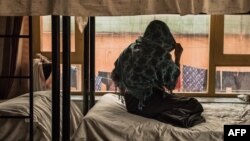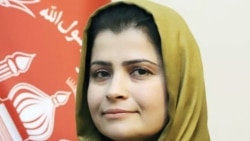Fahima Sarfaraz, an acid attack survivor who briefly stayed in a shelter to avoid domestic violence, is concerned for her friends and other women who used to live with her in the group home in Kabul, Afghanistan.
"Taliban have closed down all the women’s shelters in the country," Sarfaraz told VOA. "I stayed in one of the shelter homes briefly because I felt safe there. All the women who stayed there felt safe. I am very concerned about those women because they used to tell me stories about their life, how they were abused and beaten up by their family members. Honestly, I do not know if those women would be even alive."
The acting Taliban government has shuttered 32 shelter homes in Afghanistan since Aug. 6, veritably eliminating the last sanctuary for Afghan women fleeing domestic violence and abuse. These shelters, which were supported by international donors, had long provided a safe haven to thousands of victims of domestic violence, mental torment and abuse.
After the last of them had closed, most of the former residents were forced to rejoin their abusive families.
"Once a woman leaves home in Afghan society, she can be killed for honor, and no one will question the killer," Sarfaraz said.
Kevin Schumacher, deputy executive director of the U.S.-based Women for Afghan Women (WAW), told VOA that members of the acting Taliban government physically went to the shelters, closing them one by one.
"They verbally and physically abused our staff, shouted at them and threatened to skin them alive," he said. "We tried to negotiate, argue and reason with them, but it did not work."
Due to the mass closures, many WAW clients have been reintegrated into their families — some of their own volition, and others, Shumacher said, because they "had no way out."
"This is so unfortunate, because these women are the survivors of domestic violence. They were girls who were forced into marriage at a very young age despite their consent," he said. "Many of these victims have experienced physical, psychological sexual abuse and torture."
Since the closures, Schumacher said, WAW has lost communication with the victims and is concerned about their safety and survival.
"These shelter providers were part of a larger [system of equality]," he said. "We had ... family guidance centers across the country. Families used to come to us with any issues that they've had. We tried to mediate and … resolve the issues through psychological counseling, social counseling, and jirga [tribal council] or family conversations. And if none of this worked, then we provided them with shelters for protection.
"And when the person was moved to the shelter," he added, "we would provide … legal services in collaboration with the government, with the Ministry of Justice, Ministry of Women's Affairs and the prison authorities."
Thousands will suffer
In a recent report, Amnesty International expressed grave worries about these victims of domestic and gender-based abuse.
"Women and girl survivors of gender-based violence have essentially been abandoned in Afghanistan," said Agnès Callamard, Amnesty International's secretary-general, in the Dec. 8 report. "Their network of support has been dismantled, and their places of refuge have all but disappeared."
Victims of abuse, along with "shelter staff, lawyers, judges, government officials, and others involved in protective services," now live with the day-to-day risk of violence and even death, says the report, which calls upon the international community to provide immediate and long-term funding for protective services and survivor evacuation.
Thousands of women and children are likely to suffer, said Heather Barr, associate director of Human Rights Watch's women's rights division.
"It's a tragedy because women's rights activists fought hard for so many years, for the last 20 years, to build the system that would mean that women and girls who would face violence would have somewhere to take refuge," she told VOA.
"They fought hard for the passage of elimination of violence against women, and all of these systems disappeared in one day on August 15th, 2021," she said, referring to the day Kabul fell to Taliban forces.
"It is a very painful situation," said Durani Jawed Waziri, ex-spokesperson for former President Ashraf Ghani. "The Taliban did not only [fail to] include any women in their interim government Cabinet and eliminate the ministry of women's affairs, but they even banned the age 12 to 18 girls to go to school and get education.
"Taliban have not changed and will not change," added Waziri, who also used to work with the attorney general's office as an adviser to eliminate domestic violence.
"While I worked with these women who lived in the shelter homes, I saw how helpless they were," she said. "Most of these women were victims of physical violence; their husbands had cut off their noses, their ears. I saw women who had mental issues and had been raped on the streets and were pregnant. They had nowhere else to go to. I have been thinking about those women. I do not know where they might be or under which circumstances they might be living."
Abdul Wassey, the Taliban's head of international nongovernmental organizations in Afghanistan, declined to comment when VOA's Deewa Service reached him by phone.
This story originated in VOA's Deewa Service.


